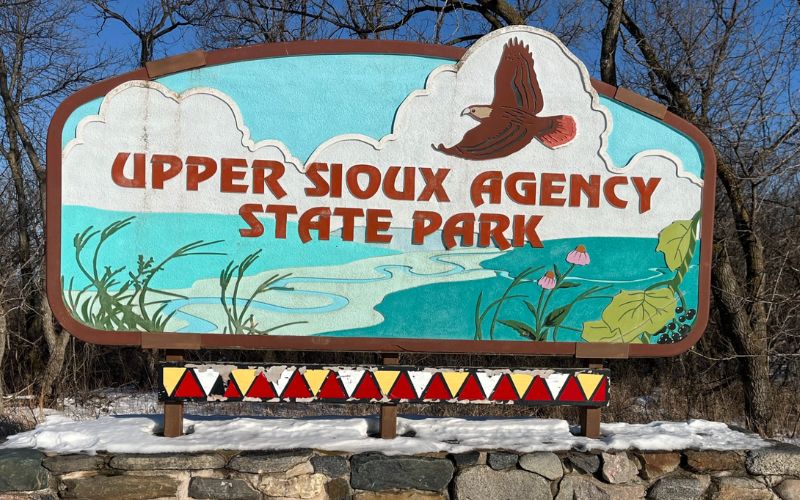
- Details
- By Kaili Berg
The park will be closed to the public beginning February 16, as it prepares to transfer the land back to the Upper Sioux Community.
The Upper Sioux Community has had a longstanding request for the State of Minnesota to return the land that holds secret burial sites of Dakota people who died during the U.S.-Dakota War of 1862 when the U.S. government failed to fulfill treaty promises
The 1,3000-acre park of rolling hills, bent oak trees, and wild prairie flowers includes the remains of a government-run campus of employee housing, warehouses, and a manual labor school that was destroyed in the war.
Chief Walking Iron Mazomani, leader of the Wahpetonwan (Dwellers in the Leaves) Dakota Tribes, was also buried on a ridge at the state park after being killed during the Dakota War’s Battle of Wood Lake.
After the U.S. won the war, numerous Dakota people were taken into custody by the U.S. military, according to the Minnesota Historical Society. Over the course of three weeks, the military commission tried 392 Dakota men for their participation in the war and sentenced 303 of them to death. The defendants were not allowed legal representation and some trials lasted less than five minutes.
On December 26, 1862, 38 Dakota men were hung in Mankato, an event that remains the largest single execution in American history. A memorial honors the Dakota men killed, located 110 miles from the park.
Kevin Jensfold, Chairman of the Upper Sioux Community, had asked lawmakers and the U.S Department of Interior for 18 years to close the park, arguing that it was unjust that Dakota people needed to pay a state fee to visit the graves of their ancestors, according to MPRnews.
Lawmakers made the decision to return the land during last year’s legislative session. The transfer is folded into several large bills covering variouus issues. The bills allocate more than $6 million to facilitate the transfer by 2033.
The Upper Sioux Agency State Park is one of the less visited state parks, getting about 35,000 visitors a year. The park has also faced challenges in the past, needing costly repairs caused by main roads and access points being washed out from flooding of the Yellow Medicine River.
Ideas suggested from public input on new recreational opportunities include hiking, camping, biking, horseback riding, and whitewater kayaking.
This is the first time Minnesota has transferred a state park to a Native American community. In recent years, some tribes in the U.S., Canada, and Australia have gotten their rights to ancestral lands restored through the Land Back movement, according to MPRnews.
Once the park is closed the DNR will remove park infrastructure prior to the land transfer set to take place in March.
More Stories Like This
Chilkat Indian Village Tells New Palmer Mine Owners They Are “Not Welcome” in Chilkat ValleyTribes, Coastal Group Ask Army Corps to Revoke Permit for Texas Export Terminal
Michigan Tribes Tell Supreme Court: Don’t Bail Out Enbridge
Alaskans Raise More Than $1 Million For Communities Devastated by Typhoon Halong
A True American Tale: Indigenous Rights vs. Corporate Greed
Help us tell the stories that could save Native languages and food traditions
At a critical moment for Indian Country, Native News Online is embarking on our most ambitious reporting project yet: "Cultivating Culture," a three-year investigation into two forces shaping Native community survival—food sovereignty and language revitalization.
The devastating impact of COVID-19 accelerated the loss of Native elders and with them, irreplaceable cultural knowledge. Yet across tribal communities, innovative leaders are fighting back, reclaiming traditional food systems and breathing new life into Native languages. These aren't just cultural preservation efforts—they're powerful pathways to community health, healing, and resilience.
Our dedicated reporting team will spend three years documenting these stories through on-the-ground reporting in 18 tribal communities, producing over 200 in-depth stories, 18 podcast episodes, and multimedia content that amplifies Indigenous voices. We'll show policymakers, funders, and allies how cultural restoration directly impacts physical and mental wellness while celebrating successful models of sovereignty and self-determination.
This isn't corporate media parachuting into Indian Country for a quick story. This is sustained, relationship-based journalism by Native reporters who understand these communities. It's "Warrior Journalism"—fearless reporting that serves the 5.5 million readers who depend on us for news that mainstream media often ignores.
We need your help right now. While we've secured partial funding, we're still $450,000 short of our three-year budget. Our immediate goal is $25,000 this month to keep this critical work moving forward—funding reporter salaries, travel to remote communities, photography, and the deep reporting these stories deserve.
Every dollar directly supports Indigenous journalists telling Indigenous stories. Whether it's $5 or $50, your contribution ensures these vital narratives of resilience, innovation, and hope don't disappear into silence.
 The stakes couldn't be higher. Native languages are being lost at an alarming rate. Food insecurity plagues many tribal communities. But solutions are emerging, and these stories need to be told.
The stakes couldn't be higher. Native languages are being lost at an alarming rate. Food insecurity plagues many tribal communities. But solutions are emerging, and these stories need to be told.
Support independent Native journalism. Fund the stories that matter.
Levi Rickert (Potawatomi), Editor & Publisher

